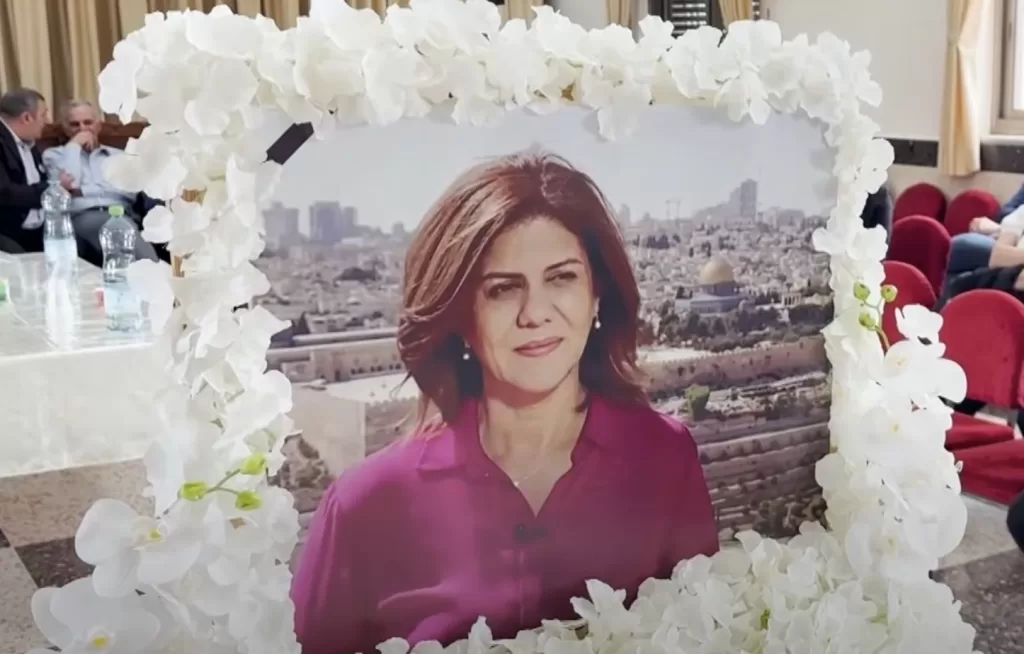
Editor’s note: As this story is being published, it has been reported that 55 journalists and media workers have been killed, not 42. The following is an excerpt from a program that originally appeared at democracynow.org on Nov. 17, 2023 about the war in Gaza. The portion below addresses the killing of 42 journalists and media workers since October 7th. Independent journalist Sharif Abdel Kouddous, who produced the award-winning documentary, ‘The Killing of Shireen Abu Akleh’ for Al Jazeera’s documentary series Fault Lines and has reported from Gaza for Democracy Now! and other outlets, joins Amy Goodman. The full, original program can be found here: https://www.democracynow.org/2023/11/17/israel_gaza_sharif_abdel_kouddous.
AMY GOODMAN: Sharif, the number of journalists who have been killed, I think the Committee to Protect Journalists says at least 42 journalists and media workers have been killed since October 7th. It’s the deadliest month for journalists since the group began collecting information in 1992. If you can talk about the global response, the global journalist response? And then we’ll talk a bit about the latest on Shireen Abu Akleh, who was killed not in Gaza by the Israeli forces, but was killed last year outside the Jenin refugee camp.
SHARIF ABDEL KOUDDOUS: Yeah. I mean, what can you say? I don’t know what the number is even now. You know, it’s at least 35, maybe 40 Palestinian journalists have been killed in just over a month, by far the highest number of journalists killed in such a short amount of time. And, you know, foreign journalists can’t get into Gaza. Israel is not letting them in, and nor is Egypt. So you have a situation where you’re killing most of the journalists, the registered journalists in Gaza. You’re not letting other journalists in. And then we’ve seen very problematic coverage from newsrooms, Western newsrooms, of what’s happening on the ground, problematic language, and people have been protesting this. And we just saw — you know, people have been resigning from The New York Times. The poetry editor of The New York Times just resigned from there, you know, because of the language used by The New York Times in this coverage.
But also, you know, you haven’t seen the type of outcry that one would imagine from the journalistic community for their colleagues who are being killed in Gaza. And the ones that aren’t killed in Gaza have lost so much. They’ve lost their families. They’ve lost their homes. When Jamal Khashoggi was brutally murdered by the Saudi government, there was massive condemnation from Western news outlets for the murder, and rightly so. When Evan Gershkovich, The Wall Street Journal reporter, who remains in prison in Russia, was arrested, there has been and still remains a massive outcry over his arrest. But we haven’t seen the same kind of outcry over this record number of journalists, Palestinian journalists, that have been killed in Gaza. I think it’s deeply, deeply problematic and reveals a bias that is being laid bare in many ways.
And as you mentioned Shireen Abu Akleh, you know, when the assault on Gaza began on October 7th, we saw people post on Twitter, on social media, photos of Shireen and just saying that, kind of wishing that she was around, that she was alive to report, because she was such an incredible journalist and so needed in a time like this. You know, even the Lebanese journalist who was killed in shelling in southern Lebanon by Israel — Issam Abdallah — one of his last tweets was a photo of Shireen. And he just wrote, “Shireen,” with a heart. And then, after he was killed, someone put up his photo and said “Issam,” with a heart.
AMY GOODMAN: And the latest news about the Israeli army bulldozing the memorial for Shireen where she was killed?
SHARIF ABDEL KOUDDOUS: Right. I mean, as we heard in headlines, you know, Israel has repeatedly conducted very brutal raids on Jenin, on the Jenin refugee camp, which is the heart of militant Palestinian resistance in the West Bank. We’ve seen drone strikes on Jenin. Just a few days ago, a drone strike killed about 14 Palestinians in Jenin, one of the deadliest days in the West Bank since 2005. And we saw drone strikes just the other day, as well, and raids on the hospital.
And during one of these raids, they came in — the site where Shireen was shot by an Israeli sniper has become a memorial area. When I went there last year to report on her killing, there’s photos of her everywhere. There’s flowers. There’s written pieces of tribute that are all hung up. The tree where she was killed under, you can still see the bullet holes. And it’s a place where family and friends have sought some solace by visiting this area and remembering Shireen. And an Israeli bulldozer came in during one of these raids and completely destroyed this road and this area where this memorial was. And it seems to just be some kind of vindictive act, because there was no reason to destroy this road that leads to the entrance of the Jenin refugee camp.
In an earlier raid, they destroyed this memorial which was in the shape of a horse, which was kind of well known in Jenin, in a main roundabout, and was built from the pieces of an ambulance that was blown up in an airstrike by Israel in 2002. They used the parts of the destroyed ambulance to create this horse monument, which was a testament to Jenin’s spirit of resistance. They [Israel] also came in and kind of removed that. So there seems to be also an attack on symbols of resistance to Israel, as well.
